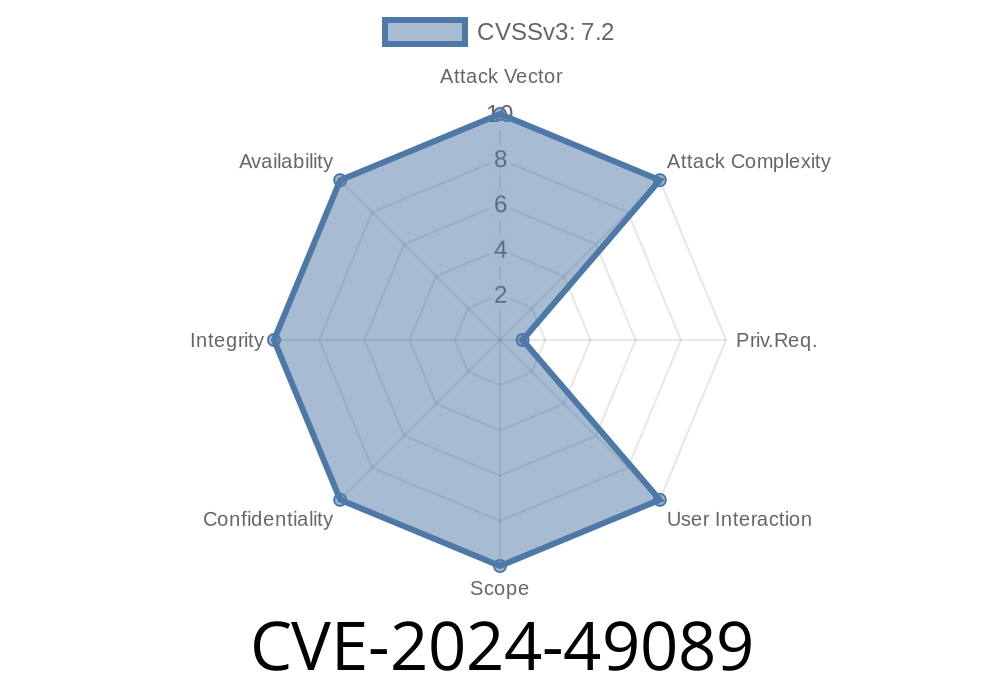In June 2024, Microsoft patched a severe vulnerability—CVE-2024-49089—affecting Windows servers running the Routing and Remote Access Service (RRAS). This vulnerability drew a lot of attention, especially among system administrators and security professionals, due to its potential for remote code execution (RCE) with high privileges.
In this article, I’ll break down what CVE-2024-49089 is, show you how this bug can be exploited (with code examples), and guide you to the most useful original resources for more information.
What is RRAS and Why Does It Matter?
The Routing and Remote Access Service (RRAS) is a feature in Windows Server that allows remote users or networks to connect to a Windows-based network using VPN, dial-up, or network routing services. It's commonly used in enterprise environments and sometimes left exposed to the internet.
If RRAS is not properly secured, vulnerabilities like CVE-2024-49089 can give attackers a foothold to run code on your server—often with SYSTEM privileges.
Vulnerability Overview
CVE-ID: CVE-2024-49089
CVSS Score: 8.1 (High)
Affected Products: Windows Server (2016, 2019, 2022) with RRAS enabled
Attack Vector: Remote, no user interaction required
Attack Complexity: Low
Simply put, attackers can send specially crafted requests to RRAS and, if successful, can run any code they want on the affected machine.
Technical Details (How Does it Work?)
At the heart of this vulnerability is poor input validation within the way RRAS handles certain types of incoming network packets. Specifically, a failure to properly sanitize buffer boundaries allows attackers to overwrite memory (buffer overflow), hijacking the execution flow to run malicious payloads.
> Note: This summary is based on the public advisory and limited reverse engineering, as Microsoft has not published full technical details.
Sample Code Snippet: Malicious Packet Construction
Let’s look at a simplified Python example to visualize how exploitation might work (for educational purposes only). This script crafts a malformed packet targeting the RRAS service:
import socket
# Target RRAS server IP and port (typically 1723 for PPTP or 1701 for L2TP)
target_ip = '192.168.1.100'
target_port = 1723
# Simple buffer overflow example: 1024 'A's
payload = b'A' * 1024
with socket.socket(socket.AF_INET, socket.SOCK_STREAM) as s:
s.connect((target_ip, target_port))
s.sendall(payload)
print("Malicious packet sent")
The service expects a valid RRAS packet, but instead receives a huge, malformed payload.
- If the service is vulnerable, it may overwrite key memory sections and execute code at the attacker's direction.
> DISCLAIMER: Do not use this code on any system you do not own or have explicit permission to test. This is for educational purposes only.
Verify external exposure: Is RRAS accessible from outside your network?
- Check if the June 2024 Microsoft updates have been applied. The relevant patch is listed here.
Use the following PowerShell to check installed updates
Get-HotFix | Where-Object {$_.Description -eq "Security Update"}
Install Microsoft’s Official Patch.
Microsoft’s patch is the only reliable mitigation. Download it from the MSRC advisory.
References & Further Reading
- Microsoft Security Response Center: CVE-2024-49089
- Microsoft June 2024 Patch Tuesday Release Notes
- Community writeup by GTSC (pending for when public)
- RRAS Overview - Microsoft Docs
Conclusion
CVE-2024-49089 is a critical reminder that exposed infrastructure services like RRAS need constant monitoring and prompt patching. Even rarely-used features can become prime targets for attackers. If your organization relies on RRAS, patch immediately, review your exposure to the internet, and consider alternatives if possible.
Stay ahead of vulnerabilities: subscribe to security advisories, automate patch management, and always follow the principle of least privilege.
Timeline
Published on: 12/12/2024 02:04:34 UTC
Last modified on: 12/12/2024 19:07:18 UTC
